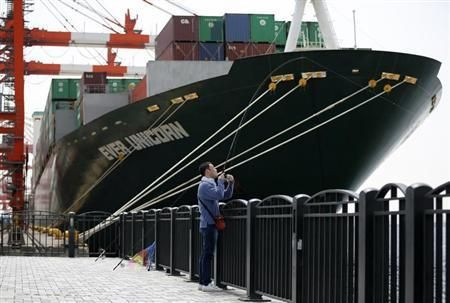Japan Export Growth Slows In Warning About Overseas Demand

(Reuters) - Japan's annual export growth slowed sharply in March due to weaker shipments to China, casting doubt that a recovery in external demand could help offset the impact of the April 1 sales tax hike.
Ministry of Finance data showed that exports rose 1.8 percent in March from a year earlier, following a 9.8 percent annual gain in the previous month. That was well below a 6.3 percent increase expected by economists in a Reuters poll.
The weak external shipments helped push Japan's trade deficit to a record 13.75 trillion yen ($134.45 billion) for the fiscal year that ended in March.
The latest data joins a recent string of soft economic reports including capital spending and private consumption, which have kept alive expectations for the Bank of Japan to offer fresh stimulus this summer to sustain growth.
After speeding past many of its developed country peers in the first half of last year, Japan's economy has slowed in recent quarters as the effects of Tokyo's aggressive stimulus faded. Concerns of a deeper pullback have hit investor confidence and the stock market this year, although policymakers say they are prepared to look through short term dips in growth.
The BOJ has repeatedly shrugged off speculation of fresh easing, insisting that the economy is on track to meet its 2 percent inflation target, but the burden may fall more on the government to take further steps to support business investment.
"Exports are weak because Japanese products are not as competitive as they used to be," said Yasuo Yamamoto, senior economist at Mizuho Research Institute.
"This suggests the economy will struggle to recover after the sales tax hike. The government needs to do more with its growth strategy to make companies more competitive."
The weakness in exports - a key driver of the world's third-biggest economy - has been a concern for policymakers, who are counting on stronger shipments to help cushion any slide in domestic demand after the sales tax rise to 8 percent from 5 percent.
Japan's shipments to China rose an annual 4.3 percent in March, a marked slowdown from a 27.6 percent annual increase in February.
Exports have struggled to accelerate despite a soft yen, which has boosted import costs more than it promoted shipments, leading to a record 21th straight month of trade deficits.
MOF data showed imports grew 18.1 percent in the year to March, boosted by elevated import costs of fuel due to a weak yen and the last-minute demand before the April 1 tax hike.
That compared with a 16.2 percent annual gain forecast by economists and followed a 9.0 percent rise in the previous month.
The country's trade balance stood at a deficit of 1.446 trillion yen in March, against an expected shortfall of 1.070 trillion yen, after a record trade gap of 2.79 trillion yen in January. That marked a record 21-month run of deficits.
Japan's government cut its overall economic view for the first time since 2012 due to pullback in demand after the tax hike. But it saw no need for more stimulus, saying that the economy was on track for a moderate recovery.
Policymakers and economists expect a temporary dip in economic activity in the current quarter due to the sales tax rise, but they see the economy returning to moderate growth in the following quarters.
© Copyright IBTimes 2025. All rights reserved.





















